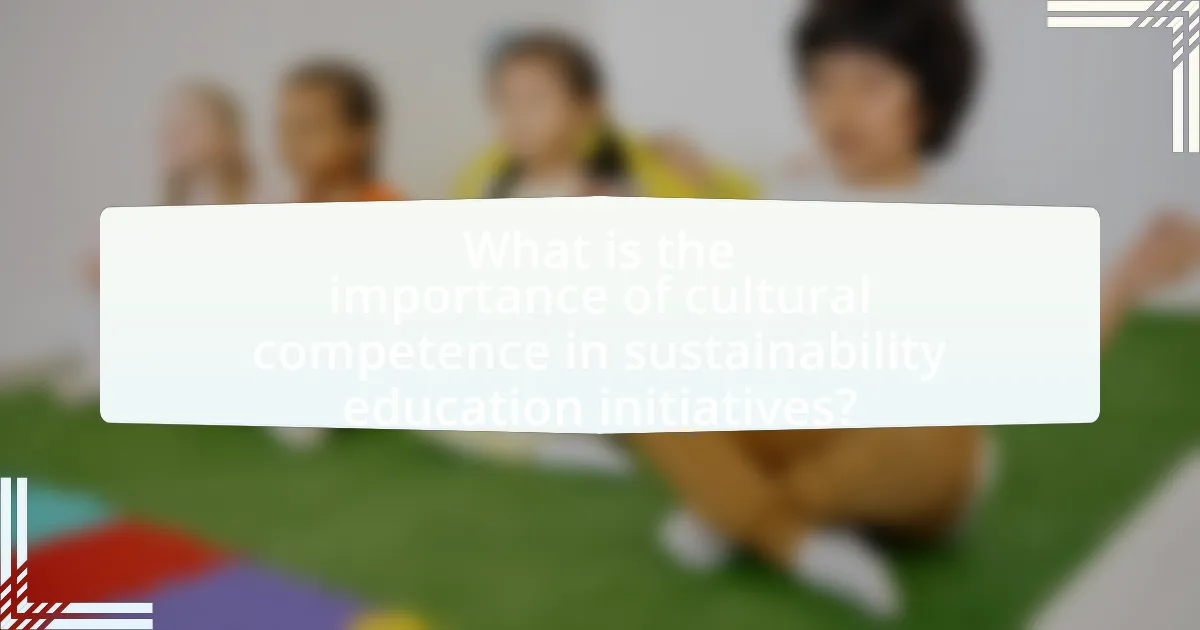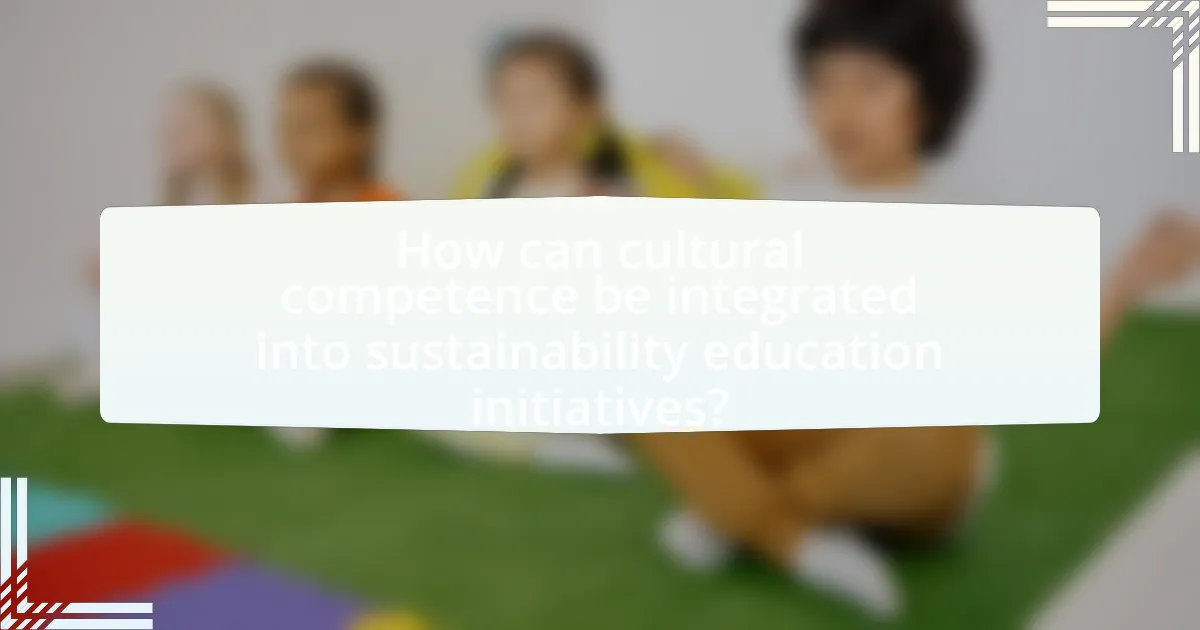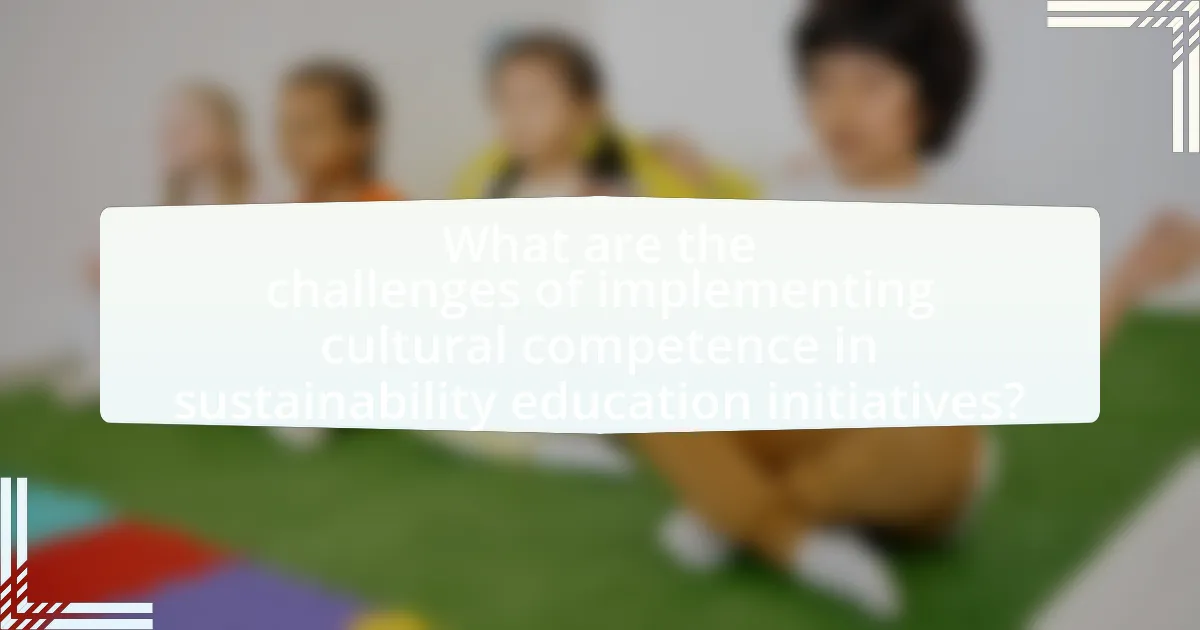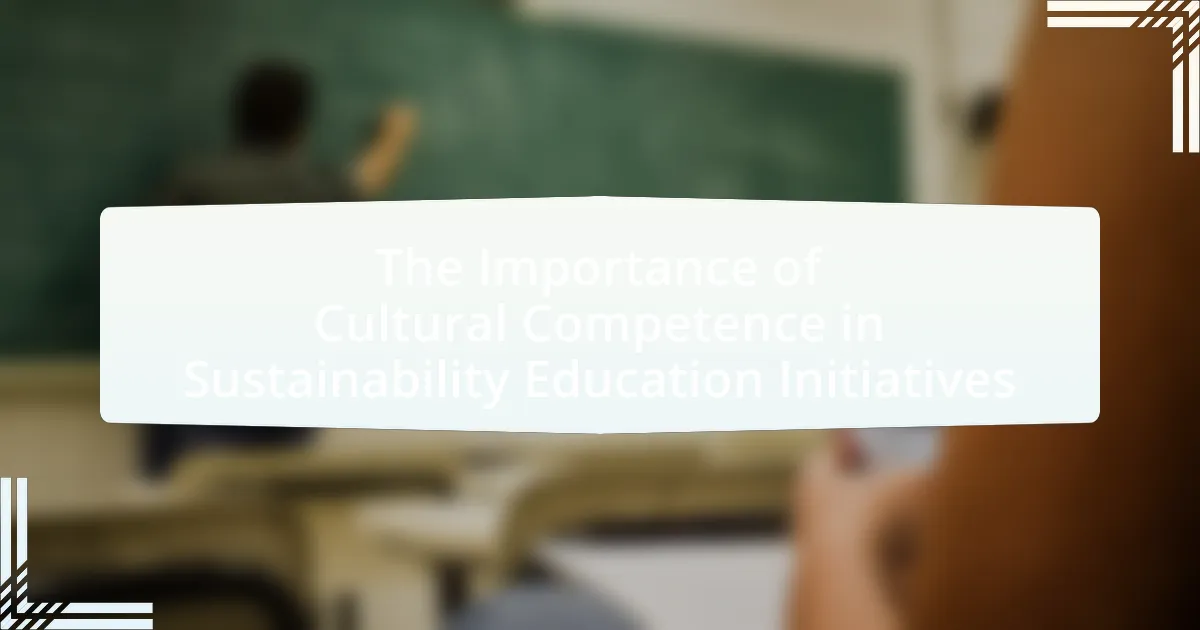Cultural competence is essential in sustainability education initiatives as it integrates diverse cultural perspectives into environmental practices and policies, enhancing community engagement and participation. The article explores how cultural competence improves sustainability education by fostering inclusive learning environments, tailoring programs to specific cultural contexts, and increasing learner engagement. Key elements of cultural competence, such as awareness, knowledge, skills, and attitudes, are discussed, along with strategies for educators to develop these competencies. The article also addresses the challenges and barriers faced in implementing cultural competence, emphasizing the importance of community input and collaboration with local organizations to create effective and relevant sustainability education initiatives.

What is the importance of cultural competence in sustainability education initiatives?
Cultural competence is crucial in sustainability education initiatives because it ensures that diverse cultural perspectives are integrated into environmental practices and policies. By recognizing and valuing different cultural backgrounds, educators can tailor sustainability programs to be more relevant and effective for various communities. Research indicates that culturally competent approaches lead to increased community engagement and participation in sustainability efforts, as they resonate more deeply with local values and traditions. For instance, a study by the National Oceanic and Atmospheric Administration found that culturally relevant education significantly improved the effectiveness of conservation programs in diverse communities. This demonstrates that cultural competence not only enhances the educational experience but also fosters more sustainable outcomes by aligning initiatives with the unique needs and insights of different cultural groups.
How does cultural competence enhance sustainability education?
Cultural competence enhances sustainability education by fostering inclusive learning environments that respect diverse perspectives and practices. This inclusivity allows educators to tailor sustainability initiatives to the specific cultural contexts of different communities, thereby increasing engagement and effectiveness. Research indicates that culturally relevant pedagogy improves student outcomes, as it connects sustainability concepts to the lived experiences of learners, making the education more relatable and impactful. For example, a study published in the Journal of Environmental Education Research found that students from diverse backgrounds showed greater interest and understanding in sustainability topics when lessons incorporated their cultural values and practices.
What are the key elements of cultural competence in this context?
The key elements of cultural competence in the context of sustainability education initiatives include awareness, knowledge, skills, and attitudes. Awareness involves recognizing one’s own cultural biases and understanding how these biases can affect interactions with diverse communities. Knowledge encompasses understanding the cultural backgrounds, values, and practices of different groups, which is essential for effective communication and collaboration. Skills refer to the ability to engage respectfully and effectively with individuals from various cultures, facilitating inclusive participation in sustainability efforts. Lastly, attitudes involve fostering an openness and respect for cultural diversity, which is crucial for building trust and partnerships in sustainability initiatives. These elements collectively enhance the effectiveness of educational programs by ensuring they are relevant and accessible to all cultural groups involved.
How does cultural competence influence learner engagement in sustainability education?
Cultural competence significantly enhances learner engagement in sustainability education by fostering an inclusive environment that respects diverse perspectives. When educators integrate cultural competence into their teaching, they create a space where learners feel valued and understood, which increases their motivation to participate actively. Research indicates that culturally responsive teaching methods lead to higher student engagement and achievement, as they connect sustainability concepts to the cultural backgrounds and experiences of learners. For instance, a study by Gay (2010) highlights that culturally relevant pedagogy not only improves academic performance but also encourages critical thinking about sustainability issues that resonate with students’ lives. This alignment between cultural relevance and educational content ultimately drives deeper engagement in sustainability education.
Why is cultural competence essential for diverse communities in sustainability education?
Cultural competence is essential for diverse communities in sustainability education because it fosters inclusive learning environments that respect and integrate various cultural perspectives. This inclusivity enhances engagement and participation, leading to more effective communication and collaboration among community members. Research indicates that culturally competent approaches in education can improve knowledge retention and application of sustainability practices, as they resonate more deeply with individuals’ values and experiences. For instance, a study by the National Academies of Sciences, Engineering, and Medicine highlights that culturally relevant pedagogy significantly increases student motivation and achievement in environmental education programs. Thus, cultural competence not only enriches the educational experience but also promotes sustainable practices that are more likely to be embraced by diverse populations.
How does cultural diversity impact sustainability education initiatives?
Cultural diversity significantly enhances sustainability education initiatives by incorporating varied perspectives and practices that enrich learning experiences. This diversity allows for the integration of local knowledge systems, which can lead to more effective and contextually relevant sustainability solutions. For instance, research indicates that educational programs that embrace cultural diversity can improve engagement and retention rates among students, as they feel their backgrounds and experiences are valued. Furthermore, a study published in the Journal of Environmental Education Research found that culturally inclusive curricula foster critical thinking and problem-solving skills, essential for addressing complex sustainability challenges. Thus, cultural diversity not only broadens the scope of sustainability education but also strengthens its impact by making it more relatable and applicable to diverse communities.
What role does cultural competence play in addressing local environmental issues?
Cultural competence plays a crucial role in addressing local environmental issues by enabling effective communication and collaboration among diverse community members. When individuals understand and respect different cultural perspectives, they can better engage with local populations to identify environmental challenges and co-create solutions that are culturally relevant. For instance, research indicates that culturally competent approaches in environmental education lead to increased community participation and more sustainable practices, as seen in programs that incorporate indigenous knowledge systems alongside scientific methods. This integration fosters trust and empowers communities to take ownership of environmental initiatives, ultimately leading to more effective and lasting outcomes.

How can cultural competence be integrated into sustainability education initiatives?
Cultural competence can be integrated into sustainability education initiatives by incorporating diverse cultural perspectives and practices into the curriculum. This approach ensures that sustainability education is relevant and accessible to various communities, acknowledging their unique environmental challenges and solutions. For instance, programs can include case studies that highlight indigenous knowledge systems, which often emphasize sustainable land management practices that have been effective for generations. Research shows that culturally relevant education enhances engagement and retention, as evidenced by a study published in the Journal of Environmental Education Research, which found that students who learned through culturally responsive methods demonstrated a deeper understanding of sustainability concepts. By actively involving local communities in the development and implementation of educational programs, sustainability initiatives can foster a sense of ownership and responsibility, ultimately leading to more effective environmental stewardship.
What strategies can educators use to develop cultural competence?
Educators can develop cultural competence by implementing strategies such as integrating diverse perspectives into the curriculum, engaging in continuous professional development, and fostering inclusive classroom environments. Integrating diverse perspectives ensures that students learn about various cultures, which enhances their understanding and appreciation of diversity. Continuous professional development, including workshops and training on cultural awareness, equips educators with the necessary skills to address cultural differences effectively. Fostering inclusive classroom environments encourages open dialogue and respect among students from different backgrounds, promoting a sense of belonging. Research indicates that culturally responsive teaching improves student engagement and academic success, highlighting the effectiveness of these strategies in enhancing cultural competence among educators.
How can curriculum design reflect cultural competence in sustainability education?
Curriculum design can reflect cultural competence in sustainability education by integrating diverse cultural perspectives and practices related to environmental stewardship. This approach ensures that students learn about sustainability through the lens of various cultural values, traditions, and knowledge systems, which enhances their understanding and appreciation of global environmental issues. For instance, incorporating Indigenous ecological knowledge into the curriculum allows students to explore sustainable practices that have been effective for centuries, thereby validating and respecting cultural contributions to sustainability. Research indicates that culturally relevant pedagogy improves student engagement and learning outcomes, as it connects educational content to students’ cultural contexts, fostering a more inclusive and effective learning environment.
What training resources are available for educators to enhance cultural competence?
Training resources available for educators to enhance cultural competence include online courses, workshops, and professional development programs specifically designed to address cultural awareness and sensitivity. For instance, organizations like the National Education Association offer resources and training modules that focus on culturally responsive teaching practices. Additionally, the Teaching Tolerance program provides free educational materials and professional development opportunities aimed at fostering inclusivity and understanding of diverse cultures in the classroom. Research indicates that educators who engage in these training programs are better equipped to create inclusive learning environments, which is essential for effective sustainability education initiatives.
How can partnerships with local communities enhance cultural competence in sustainability education?
Partnerships with local communities enhance cultural competence in sustainability education by integrating diverse cultural perspectives and practices into the curriculum. This collaboration allows educators to understand and respect the unique values, traditions, and knowledge systems of different communities, which is essential for effective sustainability initiatives. For instance, research by the National Academies of Sciences, Engineering, and Medicine highlights that community engagement fosters a deeper understanding of local environmental issues and promotes culturally relevant solutions. By involving local voices, sustainability education becomes more inclusive and applicable, ultimately leading to more effective and sustainable outcomes.
What are the benefits of collaborating with local cultural organizations?
Collaborating with local cultural organizations enhances community engagement and fosters cultural competence in sustainability education initiatives. This partnership allows for the integration of diverse cultural perspectives, which enriches educational content and makes it more relevant to local communities. For instance, research by the National Endowment for the Arts indicates that community-based cultural initiatives can increase participation in sustainability programs by up to 30%, demonstrating the effectiveness of such collaborations in driving engagement and awareness. Additionally, working with local cultural organizations can provide access to unique resources, knowledge, and networks that support the development of culturally responsive educational practices, ultimately leading to more effective sustainability outcomes.
How can community input shape sustainability education initiatives?
Community input can significantly shape sustainability education initiatives by ensuring that the programs are culturally relevant and address the specific needs of the community. Engaging local stakeholders allows educators to incorporate diverse perspectives, which enhances the effectiveness of the initiatives. For example, research by the National Environmental Education Foundation indicates that community-driven programs lead to higher participation rates and better outcomes, as they resonate more with the local population’s values and experiences. This alignment fosters a sense of ownership and responsibility towards sustainability efforts, ultimately leading to more impactful educational initiatives.

What are the challenges of implementing cultural competence in sustainability education initiatives?
Implementing cultural competence in sustainability education initiatives faces several challenges, including diverse cultural perspectives, resource limitations, and resistance to change. Diverse cultural perspectives can lead to misunderstandings or conflicts in values and priorities regarding sustainability, making it difficult to create a unified educational approach. Resource limitations, such as insufficient funding or lack of trained personnel, hinder the development and delivery of culturally competent programs. Additionally, resistance to change from educators or institutions can impede the integration of cultural competence into existing curricula, as stakeholders may be reluctant to alter established practices. These challenges highlight the complexity of fostering cultural competence in sustainability education, necessitating targeted strategies to address them effectively.
What barriers do educators face in promoting cultural competence?
Educators face several barriers in promoting cultural competence, including lack of training, insufficient resources, and resistance to change. Many educators report feeling unprepared to address cultural diversity due to inadequate professional development opportunities that focus on cultural competence. Research indicates that only 25% of teachers receive training specifically aimed at enhancing their cultural awareness (National Center for Education Statistics, 2020). Additionally, limited access to culturally relevant materials and curricula hampers educators’ ability to effectively teach diverse perspectives. Resistance from stakeholders, including parents and school administration, can further complicate efforts to implement culturally competent practices, as some may perceive these initiatives as unnecessary or divisive.
How can resistance to change be addressed in educational settings?
Resistance to change in educational settings can be addressed through effective communication, stakeholder involvement, and professional development. Effective communication ensures that all stakeholders understand the reasons for change, fostering a sense of ownership and reducing anxiety. Involving stakeholders, including teachers, students, and parents, in the decision-making process increases buy-in and reduces resistance. Professional development equips educators with the skills and knowledge necessary to implement changes confidently. Research indicates that when educators feel supported and informed, they are more likely to embrace new initiatives, as shown in studies by Fullan (2007) on educational change and its impact on teacher attitudes.
What are the implications of insufficient cultural competence in sustainability education?
Insufficient cultural competence in sustainability education leads to ineffective communication and engagement with diverse communities. This lack of understanding can result in the alienation of marginalized groups, hindering their participation in sustainability initiatives. Research indicates that culturally competent education fosters inclusivity and enhances the effectiveness of sustainability programs by addressing the specific needs and values of different cultural groups. For instance, a study by the National Academies of Sciences, Engineering, and Medicine highlights that culturally relevant pedagogy improves learning outcomes and community involvement in environmental initiatives. Therefore, without cultural competence, sustainability education risks perpetuating inequalities and failing to achieve its goals.
How can assessment methods be adapted to evaluate cultural competence in sustainability education?
Assessment methods can be adapted to evaluate cultural competence in sustainability education by incorporating culturally relevant scenarios and diverse perspectives into evaluation tools. This adaptation can include the use of case studies that reflect various cultural contexts, allowing learners to demonstrate their understanding of sustainability issues as they relate to different communities. Additionally, assessments can utilize reflective practices, such as journals or portfolios, where students articulate their learning experiences and cultural insights related to sustainability. Research indicates that culturally responsive assessment practices enhance student engagement and learning outcomes, as they acknowledge and validate diverse cultural backgrounds (Gay, 2010). By integrating these methods, educators can more effectively measure cultural competence in sustainability education.
What metrics can be used to measure the effectiveness of cultural competence initiatives?
Metrics to measure the effectiveness of cultural competence initiatives include participant feedback, demographic representation, and behavioral changes. Participant feedback can be gathered through surveys and interviews, assessing perceptions of inclusivity and understanding. Demographic representation evaluates whether the initiative successfully engages diverse groups, indicating its reach and relevance. Behavioral changes can be tracked through observable actions, such as increased collaboration among diverse teams or improved communication across cultural lines. These metrics provide concrete evidence of the initiative’s impact on fostering cultural competence within sustainability education.
How can feedback from diverse learners inform improvements in sustainability education?
Feedback from diverse learners can significantly inform improvements in sustainability education by highlighting varied perspectives and cultural contexts that influence understanding and engagement with sustainability issues. For instance, research indicates that incorporating culturally relevant examples and practices enhances learning outcomes, as seen in studies like “Culturally Relevant Pedagogy: Ingredients for Critical Teacher Reflection” by Ladson-Billings, which emphasizes the importance of cultural context in education. By analyzing feedback from learners of different backgrounds, educators can adapt curricula to be more inclusive, ensuring that sustainability education resonates with a broader audience and addresses specific community needs. This approach not only fosters greater engagement but also promotes a more comprehensive understanding of sustainability challenges and solutions across diverse populations.
What best practices can be adopted for fostering cultural competence in sustainability education initiatives?
To foster cultural competence in sustainability education initiatives, best practices include integrating diverse cultural perspectives into the curriculum, promoting community engagement, and providing training for educators on cultural awareness. Integrating diverse cultural perspectives ensures that sustainability issues are viewed through various cultural lenses, which enhances understanding and relevance. Promoting community engagement allows for collaboration with local communities, ensuring that their knowledge and values are respected and incorporated. Training educators on cultural awareness equips them with the skills to recognize and address cultural differences, ultimately leading to more inclusive and effective educational practices. These practices are supported by research indicating that culturally responsive teaching improves student engagement and learning outcomes in diverse educational settings.
How can ongoing professional development support educators in this area?
Ongoing professional development supports educators in enhancing cultural competence within sustainability education initiatives by providing them with updated knowledge and skills relevant to diverse cultural contexts. This development enables educators to understand and integrate various cultural perspectives into their teaching practices, fostering an inclusive learning environment. Research indicates that culturally competent educators are more effective in engaging students from diverse backgrounds, which is crucial for the success of sustainability initiatives that often require community involvement and understanding of local cultural values. For instance, a study published in the “Journal of Environmental Education” highlights that educators who participate in professional development focused on cultural competence report improved student engagement and learning outcomes in sustainability topics.
What role does reflective practice play in enhancing cultural competence?
Reflective practice plays a crucial role in enhancing cultural competence by enabling individuals to critically assess their own beliefs, biases, and experiences in relation to diverse cultural contexts. This self-assessment fosters greater awareness and understanding of cultural differences, which is essential for effective communication and interaction in multicultural environments. Research indicates that reflective practice encourages continuous learning and adaptation, allowing educators and practitioners to develop strategies that are culturally responsive. For instance, a study by Mezirow (1991) highlights that transformative learning through reflection can lead to improved empathy and respect for diverse perspectives, thereby enhancing cultural competence in educational settings.

Leave a Reply